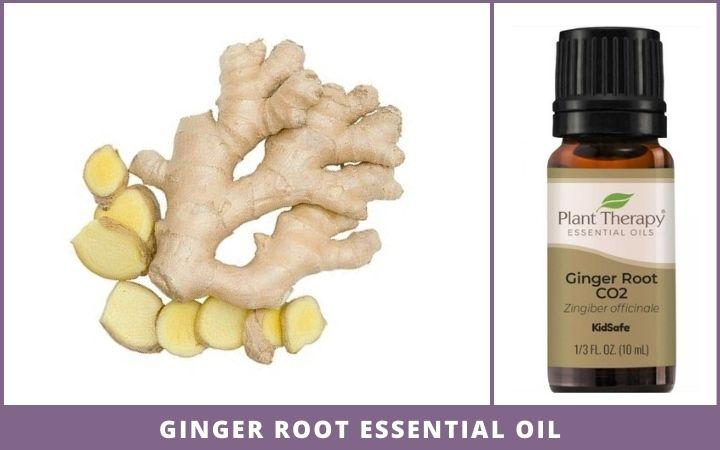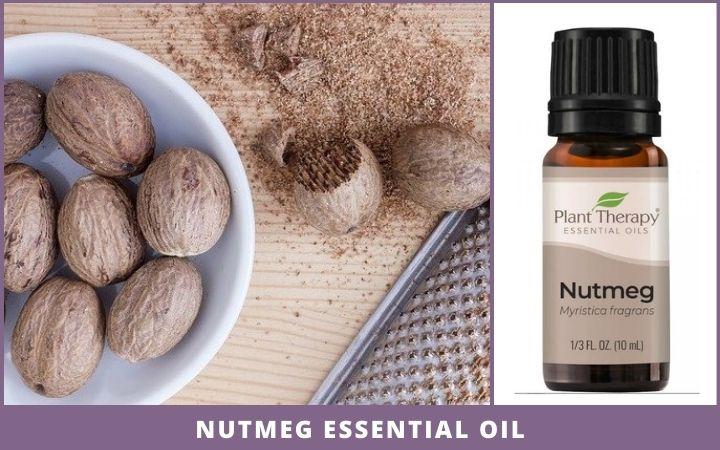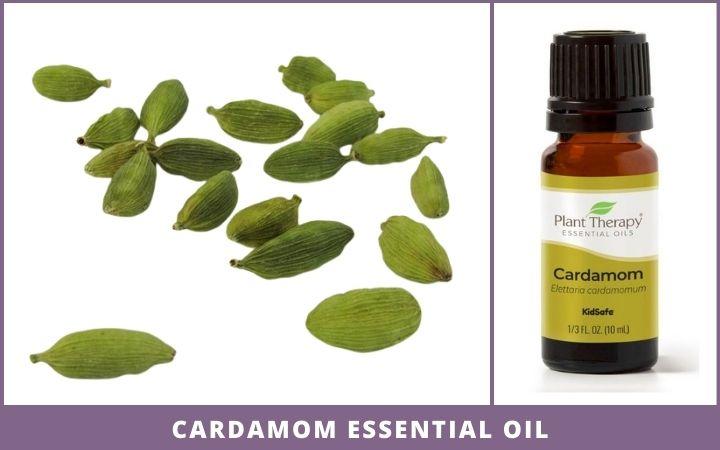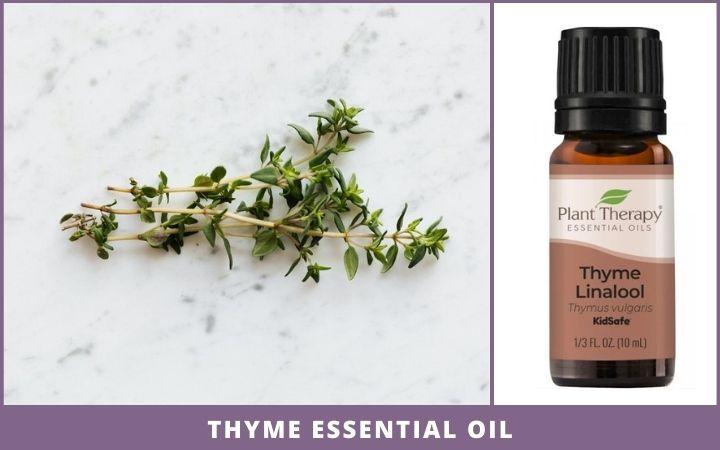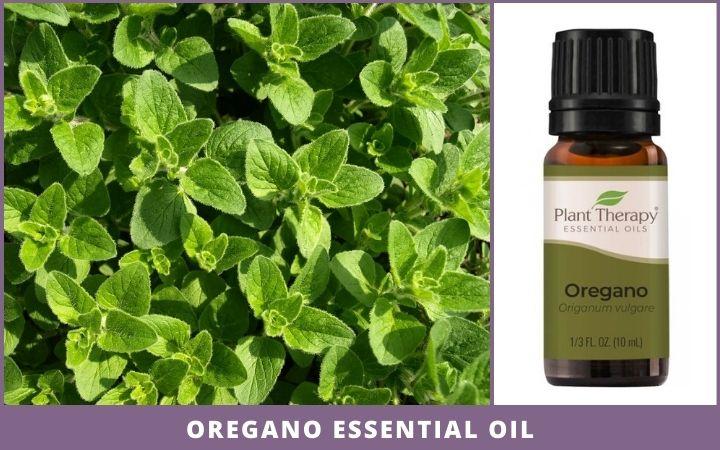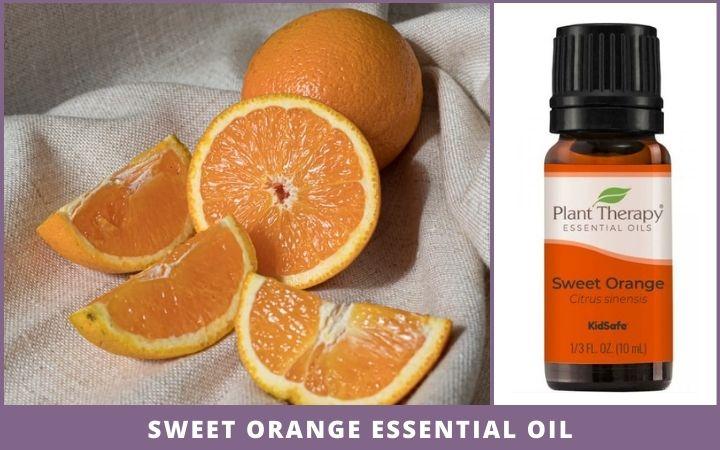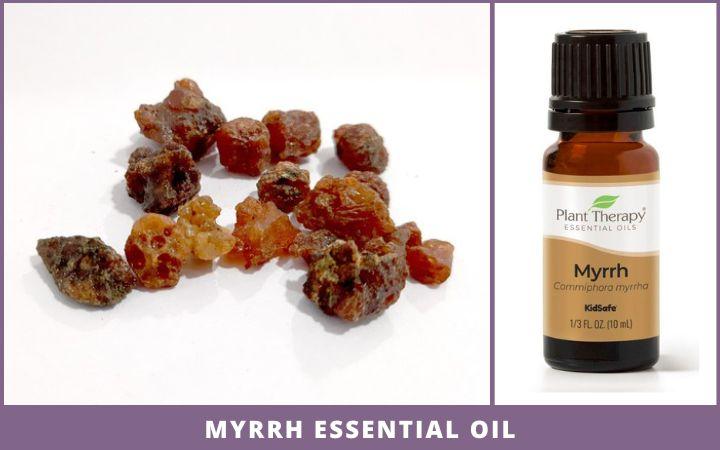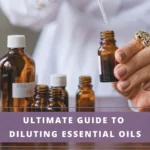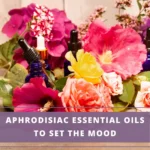As an Amazon Associate I earn from qualifying purchases. See Full Disclosure Here
As the days get shorter and the temperatures plummet, the icy cold weather keeps us indoors, craving warmth and comfort. One way to bring that cozy feeling into your home is with aromatherapy using warm essential oils that emanate warming and comforting scents.
 From lifting your mood and invigorating your senses to soothing muscle aches and easing congestion, warm essential oils are your winter wellness allies. The aroma of these oils has the power to transport you to a log cabin in the woods or evoke memories of holiday baking.
From lifting your mood and invigorating your senses to soothing muscle aches and easing congestion, warm essential oils are your winter wellness allies. The aroma of these oils has the power to transport you to a log cabin in the woods or evoke memories of holiday baking.
The scents of essential oils can stimulate the olfactory system, which is connected to the emotional and memory centers of the brain. This connection allows certain scents to evoke specific emotions and memories, making aromatherapy a powerful tool for relaxation and mood enhancement.
Here are the top 12 warm essential oils to use during the winter months, their benefits, and how to incorporate them into your daily routine.
1. Cinnamon Bark: A Warming and Invigorating Aroma
The quintessential winter scent, cinnamon bark essential oil has a warm, subtly woodsy, comforting aroma that promotes relaxation and soothes the mind. When diffused, it can evoke feelings of comfort and nostalgia, making it particularly appealing during colder seasons.
Beyond its aromatic allure, cinnamon essential oil is also recognized for its potential to support respiratory health. Inhaling its warm aroma may provide a sense of relief during times of seasonal discomfort.
When diluted appropriately, it can be used topically for massage, offering a comforting warmth that can help ease muscle tension. It’s important to note that cinnamon oil is potent, and proper dilution is crucial for safe use on the skin.
Add a few drops of cinnamon essential oil to your diffuser to create a cozy, inviting ambiance that evokes a sense of comfort and stimulates the senses.
Related: Cinnamon essential oil benefits, uses, and cautions
2. Clove: A Woody & Spicy Scent
The rich and robust scent of clove essential oil adds a comforting warmth that’s often associated with feelings of coziness and relaxation. When diffused, it creates a comforting atmosphere, making it a favorite during colder seasons or when seeking a sense of warmth and security.
The aromatic profile of clove oil is intense, with a spicy sweetness that contributes to its inviting nature. The warming and pain-relieving properties of clove essential oil make it the preferred option as a massage oil, offering a warming sensation that may help soothe sore muscles and joints.
Clove essential oil is also recognized for its potential oral health benefits. It has traditionally been used for its analgesic properties and is found in some natural dental care products.
To enjoy the benefits of clove oil, mix it with cinnamon oil in a carrier oil, such as fractionated coconut oil, and apply it to the bottoms of your feet for a soothing foot massage. Both oils belong to the spicy aroma family and should be used sparingly due to their strong aroma.
Related: Clove essential oil benefits & uses
3. Ginger: A Spicy & Energizing Aroma
The warm and spicy fragrance of ginger essential oil is known for its uplifting and energizing qualities. Its spicy notes add a comforting warmth to the air, making it particularly appealing during colder seasons.
When diffused, it creates a stimulating atmosphere that can help alleviate feelings of fatigue and promote mental alertness.
Ginger oil’s warm and spicy nature also extends to its potential benefits for the musculoskeletal system. When diluted and applied topically, it may provide relief from muscle soreness and discomfort, making it a valuable addition to massage blends and muscle care routines.
This versatile oil’s warming properties make it ideal for cold feet and hands. Plus, its zesty aroma adds a touch of sunshine to any winter day.
4. Black Pepper: A Warm & Stimulating Scent
Don’t underestimate the heat of black pepper essential oil. This spicy oil packs a punch and is a powerhouse for warming the body and relieving muscle tension, perfect for soothing those achy winter limbs.
Think of it as a liquid firecracker for those chilly mornings.
When diffused, it can create an invigorating atmosphere that promotes mental alertness and focus. The aromatic profile of black pepper oil is robust, with a peppery spiciness that adds a layer of complexity to blends, making it a valuable addition to aromatherapy.
Black pepper oil’s warming nature also extends to its potential digestive benefits. It is believed to possess carminative properties, which may help alleviate digestive discomfort and support a healthy digestive system. Incorporating black pepper oil into a massage oil or diffusing it during meals may contribute to a comforting and supportive dining experience.
5. Nutmeg: A Heady Nutty Aroma
The warm and spicy aroma of nutmeg essential oil is often described as sweet and woody with a hint of nuttiness. When diffused, it creates a comforting atmosphere that can evoke feelings of relaxation and tranquility.
The aromatic profile of nutmeg oil is both soothing and uplifting, making it a favorite during colder seasons or when seeking a sense of warmth and emotional balance.
Nutmeg oil’s warm and spicy nature also extends to its potential role in promoting mental clarity and focus. The invigorating scent may contribute to a sense of alertness and concentration, making it a valuable addition to blends aimed at enhancing cognitive function.
A soothing and grounding essential oil, nutmeg is the best warm essential oil for diffusing during meditation or to create a warming massage oil. When diluted properly, nutmeg oil can be applied topically to the abdomen for a soothing and warming effect.
Related: Nutmeg essential oil benefits & blends
6. Cardamom: A Sweet & Spicy Fragrance
A warm and inviting essential oil with a distinctively sweet and spicy fragrance, cardamom is cherished for its ability to create a warm and comforting atmosphere, making it a popular choice in aromatherapy. Known for its comforting properties, it can create a warm and inviting atmosphere, cardamom essential oil is a delightful addition to aromatherapy blends.
Cardamom’s warm nature extends to its potential to ease respiratory congestion. Inhaling the aroma of cardamom oil may provide a sense of relief during times of respiratory discomfort, contributing to overall respiratory well-being.
Whether diffused to promote emotional well-being or applied topically for a soothing massage, Cardamom is a versatile oil with a wide range of applications. Diffuse it to create a cozy ambiance or add a few drops to your bath for a luxurious soak.
Beyond its aromatic appeal, Cardamom essential oil is often used to support digestion and ease occasional stomach discomfort. This sweet and spicy oil is pure comfort in a bottle.
7. Marjoram: A Warm & Soothing Scent
 A warm and soothing herbaceous essential oil, Marjoram is known for its gentle yet comforting fragrance and a range of potential therapeutic benefits. This oil brings a sense of calm and relaxation, making it a popular choice in aromatherapy and holistic wellness practices.
A warm and soothing herbaceous essential oil, Marjoram is known for its gentle yet comforting fragrance and a range of potential therapeutic benefits. This oil brings a sense of calm and relaxation, making it a popular choice in aromatherapy and holistic wellness practices.
The warm and slightly spicy aroma of marjoram essential oil has a herbaceous and sweet aroma. When diffused, it creates a serene and inviting atmosphere, promoting a feeling of tranquility and mental well-being. The comforting nature of marjoram makes it an excellent choice for unwinding after a long day or promoting a restful night’s sleep.
Marjoram oil is also known for its potential benefits for the respiratory system. Inhaling the warm and herbal aroma may contribute to a sense of respiratory ease and comfort during times of seasonal discomfort or congestion.
When diluted properly and applied topically, it can be used in massage blends to soothe tired muscles and joints, providing a comforting warmth. This makes marjoram a valuable addition to relaxation and massage routines.
8. Rosemary: A Warm & Invigorating Aroma
The warm and herbaceous aroma of rosemary essential oil is known for its uplifting and clarifying properties. When diffused, it creates an energizing atmosphere, promoting mental clarity and focus. The invigorating scent of rosemary is often used to combat feelings of fatigue and to enhance overall cognitive function, making it a go-to choice for those seeking a revitalizing experience.
Rosemary oil is also recognized for its potential to promote circulation and ease muscle tension. When diluted properly and applied topically, it can be used in massage blends to provide a warming and soothing sensation, making it a valuable addition to relaxation and muscle care routines.
Beyond its aromatic allure, rosemary essential oil is esteemed for its potential benefits for the respiratory system. Inhaling the warm and camphoraceous aroma may provide a sense of relief during times of respiratory discomfort, contributing to overall respiratory well-being.
Rosemary is often included in blends aimed at supporting a healthy respiratory system.
9. Thyme: A Rich & Herbaceous Aroma
Thyme is a warm and herbaceous essential oil prized for its aromatic richness and potential health benefits.
When diffused, thyme essential oil can create an inviting atmosphere that promotes relaxation and mental clarity. The aromatic profile of thyme oil is robust, with earthy and medicinal undertones that contribute to its comforting nature.
Its warm and herbaceous character makes thyme essential oil a popular choice for respiratory support. Inhaling the aroma of thyme oil may contribute to a sense of relief during times of respiratory discomfort, making it a valuable addition to blends designed to support a healthy respiratory system.
When diluted properly, thyme oil can be applied topically for massage, providing a warming sensation that may help soothe tired muscles.
10. Oregano: A Warm & Potent Fragrance
Oregano is a warm essential oil distilled from the leaves and flowering tops of the oregano plant, yielding a potent and fragrant essence that has been valued for centuries.
In aromatherapy, oregano essential oil is celebrated for its warm and spicy aroma, which is believed to evoke feelings of comfort and relaxation. The oil is often used to create a soothing atmosphere, providing a sense of warmth that can be particularly comforting during colder seasons. Its rich, herbaceous scent has a grounding effect, helping to create a sense of balance and calm.
The warm and invigorating nature of oregano essential oil makes it a popular choice for diffusing during times of seasonal discomfort, helping to promote respiratory health.
Related:Benefits & uses of oregano essential oil
11. Orange: A Sweet & Uplifting Citrus Scent
Sweet orange is a delightful essential oil with a sweet and uplifting scent. Inhaling orange oil can boost your mood and bring a sense of energy and warmth.
Although it is not a warm essential oil, it’s great for use in winter for a variety of reasons.
To incorporate sweet orange essential oil into your winter routine, mix several drops with Epsom salts and add them to your bath.
Soaking in the light scent of sweet orange blossoms can be a rejuvenating experience, leaving you feeling refreshed and uplifted.
12. Myrrh: An Earthy & Comforting Aroma
Myrrh essential oil boasts a deep, warm, and slightly sweet scent that is both earthy and comforting. Recognized for its grounding and balancing effects, Myrrh is often used in aromatherapy to promote emotional well-being and relaxation.
With its historical significance in rituals and ceremonies, this oil is appreciated for its ability to instill a sense of spiritual connection.
Warm Diffuser Blend Recipes
If you prefer more complex aromas, you can create your own diffuser blends using a combination of oils from the spicy and herbaceous aroma families.
Combine warm essential oils with complementary scents to create your unique blends.
Start with a base, middle, and top note to achieve a balanced and harmonious fragrance.
Here are five warm essential oil blends that combine the aromatic richness of various oils to create delightful and comforting scents:
Spicy Herb Garden Fusion
3 drops Rosemary
2 drops Thyme
2 drops Black Pepper
1 drop Clove
This harmonious blend of rosemary, thyme, black pepper, and clove essential oils creates a savory and invigorating aroma reminiscent of a fragrant herb garden with subtle hints of warm spice.
Savory Spice Harmony
3 drops Basil
2 drops Ginger
2 drops Black Pepper
1 drop Thyme
This blend brings together the aromatic richness of basil and thyme with the warm, spicy notes of ginger and black pepper.
Herbal Spice Infusion
3 drops Sage
2 drops Cinnamon
2 drops Clove
1 drop Rosemary
An infusion of herbal and spicy goodness, this blend features the earthiness of sage, the warmth of cinnamon and clove, and the herbal depth of rosemary.
Warm Chai Elegance
3 drops Cardamom
2 drops Vanilla
2 drops Cinnamon
1 drop Nutmeg
Inspired by the comforting notes of chai, this blend combines cardamom, vanilla, cinnamon, and nutmeg for a warm and elegant fragrance.
Spicy Herb Medley
3 drops Oregano
2 drops Marjoram
2 drops Clove
1 drop Thyme
The balanced blend of oregano, marjoram, clove, and thyme essential oils, offers a robust and comforting fragrance that captures the harmonious essence of spicy and herbaceous aromas.
Spiced Citrus Bliss
3 drops Sweet Orange
2 drops Cinnamon
2 drops Clove
1 drop Ginger
This blend offers a harmonious combination of citrusy brightness and warm spice, creating an inviting and uplifting atmosphere.
Vanilla Chai Delight
3 drops Cardamom
2 drops Cinnamon
2 drops Vanilla
1 drop Nutmeg
This sweet and spicy blend mimics the comforting aroma of a warm cup of chai, creating a cozy and inviting environment.
Feel free to experiment with different combinations of oils to create your own unique winter aroma. Whether you choose to diffuse them, apply them topically, or incorporate them into your bath or bedtime routine, these oils can truly enhance your winter experience.
Benefits Of Using Warm Essential Oils & Blends
During the winter months, when cold and darkness prevail, essential oils with warming and comforting scents can bring a sense of coziness and uplift the spirits.
These oils are particularly beneficial for balancing the effects of the Vata dosha, which dominates the winter season according to Ayurveda, an ancient holistic health system. The Vata dosha is associated with qualities such as cold, dryness, and movement.
By incorporating warming essential oils into your daily routine, you can counterbalance the Vata dosha and experience a sense of grounding and relaxation.
How To Use Warm Essential Oils In Winter
Using warm essential oils can be a delightful and therapeutic experience, offering a range of benefits for relaxation, mood enhancement, and overall well-being.
Here’s a guide on how to effectively use warm essential oils:
Diffusion
Use an essential oil diffuser to disperse the warm aroma throughout the room. Diffusion helps create a cozy atmosphere, promotes relaxation, and can enhance mental focus.
Add 5-10 drops of your chosen warm essential oil to the diffuser and let it run for 15-30 minutes at a time.
Topical Application
Mix the warm essential oil with a carrier oil like jojoba, almond, or coconut oil to ensure safe application to the skin.
Apply the diluted oil to areas of tension or sore muscles for a soothing and warming massage experience.
Dab a small amount on pulse points (wrists, neck) for a subtle, personal fragrance throughout the day.
Warm Baths
Incorporate warm essential oils into your bath for a luxurious and relaxing soak.
Mix 5-10 drops of essential oil with a carrier oil or bath salts before adding to the water.
The warmth of the bath enhances the aromatic experience and can have a calming effect on both the mind and body.
Aromatherapy Inhalation
Inhale the aroma directly from the bottle or by placing a few drops on a tissue.
Add a couple of drops to a bowl of hot water, cover your head with a towel, and inhale deeply for respiratory and sinus support.
DIY Products
Candles and Wax Melts: Infuse warm essential oils into homemade candles or wax melts for a comforting and fragrant home ambiance.
Potpourri and Sachets: Create your potpourri or sachets with dried flowers, herbs, and warm essential oils to keep your living spaces pleasantly scented.
Mindful Practices
Use warm essential oils during meditation to create a grounding and soothing environment.
Inhale deeply, focusing on the scent, to promote mindful breathing and relaxation.
Precautions When Using Essential Oils
Always follow recommended dilution guidelines for topical application.
Perform a patch test to ensure no skin sensitivity or allergies.
Keep essential oils out of reach of children and pets.
Consult with a healthcare professional, especially if pregnant, nursing, or under medical supervision.
It’s important to exercise caution when using ginger essential oil, especially on the skin, as it is potent. Proper dilution ensures a safe and enjoyable experience, allowing the warm and invigorating properties of ginger to be harnessed effectively.
As the winter season unfolds, embracing the warmth and comfort of warm essential oils can elevate your mood and create a cozy atmosphere in your home.
From the invigorating scents of cinnamon and ginger to the grounding aromas of clove and sandalwood, there are endless possibilities for incorporating essential oils into your winter routine. Whether you choose to diffuse them, apply them topically, or create your own unique blends, these oils have the power to transform your winter experience.
Related Reads:
Top 10 cooling essential oils and how to use them
 Disclaimer: This information is not intended to serve as medical advice. Please consult your doctor before using any natural medication or if you experience any unusual symptoms. See Full Disclaimer here.
Disclaimer: This information is not intended to serve as medical advice. Please consult your doctor before using any natural medication or if you experience any unusual symptoms. See Full Disclaimer here.



